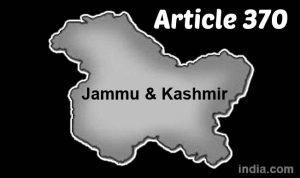Newspaper Article 12/04/2016
The Article 370 of the Indian constitution holds great significance in the context of Kashmir issue. This article relating to the state of Jammu and Kashmir came into force on 26th January 1950. According to Article 370, the state of Jammu and Kashmir would have its own constitution. The Indian parliament would have power restricted to only three subjects, i.e. defence, foreign affairs and communication. The Article 352 and Article 360 for the declaration of national emergency cannot be applied in Kashmir. The Indian citizens can neither become the citizens of Indian held Kashmir nor can they buy any property in Kashmir. Even the Indian President cannot impose his rule in the state of IHK, without the consent of the constituent assembly of Kashmir. The Indian Supreme Court has no jurisdiction in IHK.

Despite all this, amendments can be made in Article 370 by the Presidential order under Article 368 of the Indian constitution. This power had made Article 370 controversial in nature. The legal and technical aspects of Article 370 are also questionable. According to many analysts, the Article 370 is illegal and unconstitutional in nature. The Article 370 was actually drafted by a Hindu advisor of Raja Hari Singh, the Ruler of the State of Jammu and Kashmir and hence contains many gaps and limitations. The Article 370 was formulated to give impression that Kashmir is an integral part of India.
Since coming into power, the BJP government following its extremist Hindu agenda has been trying hard to abrogate this Article 370, which is giving separate identity to Kashmiris in the Indian constitution. The RSS is against the right of self-determination of Kashmiris. Modi’s policies in Kashmir are aggressive. The BJP government is fuelling Hindu-Muslim riots in Kashmir. The BJP government have attempted to change the demography of Kashmir region by converting Muslim majority in the region into Hindu majority. India had changed the demography of Kashmir by giving permanent residence status to the West Pakistan refugees of 1947. The Indian soldiers are also being settled in Kashmir to tackle terrorism but India’s basic aim is to change the demography of Kashmir to achieve its own objectives and political interests in Kashmir.
The status of Kashmir must be determined by the UN resolutions of 1948 and in accordance with the aspirations of Kashmiris. The Indian government should review its draconian laws such as Armed Forces Special Powers Act (AFSPA) and Public Safety Act (PSA) to protect civilians in Kashmir. The Indian government must withdraw its more than 600,000 Indian Security Forces deployed in Kashmir who are involved in committing atrocities and human rights violations in Kashmir. The Kashmir issue could win international support only if Kashmiri people pressurize the concerned government. Unfortunately, the Kashmir issue could not gather much international support because India has large influence at international level. There are large number of overseas Indian community who mobilize others and gather large party sympathizers for their propaganda about Kashmir and representing a positive image of India abroad irrespective of the brutality of Indian Security Forces in Kashmir.
The Kashmiris national struggle for their self-determination is their basic human right. Kashmir issue has more credence as a humanitarian issue rather than a mere human rights issue. The concern of the UN for Kashmir would come through support from the international civil society and public. There is an urgent need to amplify Kashmiri voices and their vision at international forums such as UN, OIC, and SAARC etc. The Kashmiri diaspora must be more active in their struggle. The political division and lack of unity within political parties in Kashmir have weakened their political efforts to achieve their goals. The Kashmiris must adopt more inclusive and tolerant approach towards each other. Similarly, Pakistan has a credible standing in international society and its voice for the Kashmir cause is important. Hence, Pakistan should continue to work for the Kashmir cause. At the same time, the world community has to recognize the rights of Kashmiris as it is not a question of choosing Pakistan or India but it is about the right of self-determination of Kashmiris. Pakistan and India must find peaceful and diplomatic means to settle their longstanding disputes and work together to find a practical solution to resolve the Kashmir issue.
The article was carried by Pakistan Observer on March 28,2016.
Disclaimer: Views expressed are of the writer and not necessarily reflective of IPRI policy.
